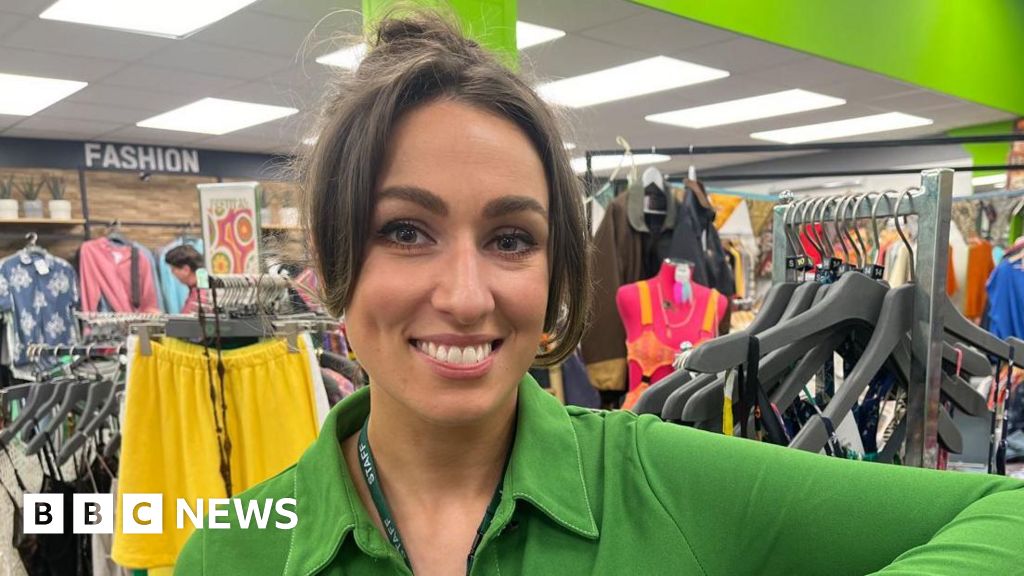- Author, Mark Simpson
- Role, BBC News NI communities correspondent
The environment, the economy or simply the desire to bag a bargain.
There are many reasons why charity shops across Northern Ireland are enjoying a surge in popularity.
One outlet in County Tyrone has reported a 25% rise in sales and donations are up by almost a third on last year.
Stephen Brown, from the Drop Inn shop in Cookstown, said public perceptions about shopping in charity shops were changing.
“I think the charity shop stigma has gone away in recent years,” he told BBC News NI.
“You have more people interested in the recycling and re-using element of clothes these days, it’s moved away from the jumble sale type thing, to charity shops being more fashion orientated.”
Mr Brown also said the cost of living crisis had influenced how people shop.
“The sense I get from our customers is that there is a need for charity shops because the cost of living is biting people’s pockets and they don’t have the same money to spend on even essential items,” he added.
“So, the fact that they can come in here and buy a top at £3, as opposed to another shop and spending a lot more, makes a big difference to their weekly outgoings.”
This week there were lengthy queues round the block when a so-called charity ‘superstore’ opened in one of the most affluent areas of County Down.
The Oxfam shop in Holywood is seven times bigger than an existing Oxfam premises in the town.
There are nine other charity shops nearby.
Katie Lewis was among the crowds hoping to pick up something nearly new.
“Everyone has jumped on the bandwagon of not buying fast fashion and not buying brand new clothes. People are more interested in second hand clothes shopping,” she said.
“I like having second hand stuff and the fact that then you’re also supporting a charity…that’s a great added bonus.”
The management of the new store in Holywood are all women and when it opened on Wednesday so were the vast majority of customers.
Fiona Anderson, manager of the 6,500m sqm (7,000 sq ft) store, said she hoped to change the perception of charity shopping among people who may be reluctant to buy second-hand goods and clothing.
She said the area was now a “destination for charity shopping”.
“Young people have been the biggest growth area for us and after lockdown I think a lot of us reviewed what was important to us and how we wanted to shop and consume, and the clothes we wear – we want to be more accountable,” Ms Anderson added.
“My goal – as much as it is to raise money for the cause – is that we want to get people feeling proud to be wearing something second-hand.”
Nicola Lyden, manager of Cancer Research UK on High Street in Holywood said she hoped to benefit from a knock on effect.
“Our shop is here 33 years. What I would say to people is ‘don’t forget us’. And hopefully there’s enough for us all here,” she said.
“Young people are really embracing charity shops now. Young people are driving it. It’s about sustainability. It’s good to see. Long may it last.”
Fifty miles away -back in Cookstown – there are four charity shops in a row.
There is also a large store based in a former car showroom.
Niamh Grevatt who works in the Marie Curie charity shop has noticed a boost in trade.
“We’ve definitely noticed an increase in foot traffic and that’s people from different backgrounds, from children, to young teens, up to our target demographic, which is generally retirement age, which would still be our main footfall,” said Niamh.
“We rely on good word of mouth, and people know the clothes here are clean at charitable prices and they know they’ll get a good deal and that’s what important to people right now.”
Richard Ramsey, the chief economist at Ulster Bank, said there was now “more sophistication” in the running of charity shops.
“They’re adapting to the cost-of-living crisis, and particularly to younger people who are more into recycling and sustainability of their purchases,” he said.
Charity shops do not have to pay business rates in Northern Ireland which helps to explain why more are being opened.
“In some ways it’s a sign of stress on the high street but it’s better to have a charity shop than an empty unit,” he said.

